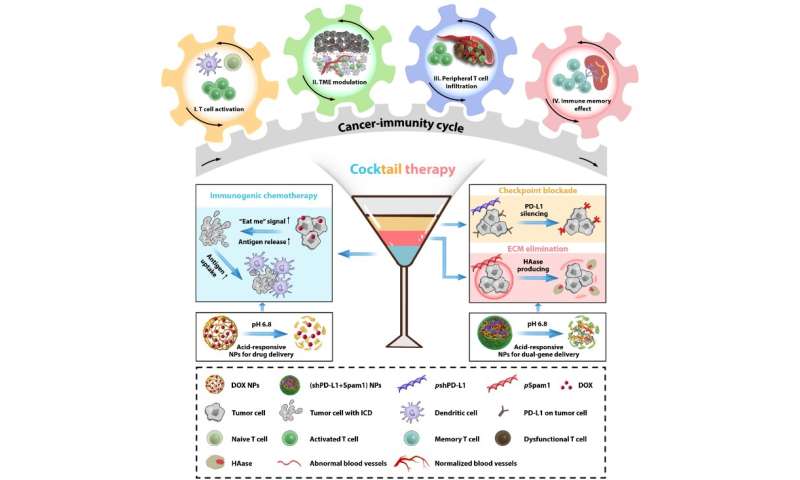
Immune checkpoint blockade therapy (ICT) has shown potential in the treatment of multiple tumors, but the poor response rate has restricted its further application.
Although scientists have developed some combination treatments to enhance the efficacy of ICT, satisfactory tumor inhibition in a variety of tumor models has not been achieved.
Recently, however, a research team led by Prof. Tian Huayu from the Changchun Institute of Applied Chemistry (CIAC) of the Chinese Academy of Sciences proposed an innovative immune cocktail therapy that combined ICT along with other therapeutic approaches. The cocktail therapy achieved multiple boosting of the cancer-immunity cycle by utilizing a nano-delivery system. The study was published in Science Advances on Sept. 30.
The proposed cocktail therapy achieved anti-tumor treatment by combining immunogenic chemotherapy, immune checkpoint blockade, and extracellular matrix elimination. It consists of two kinds of tumor microenvironment (TME) responsive drug and gene delivery nanoparticles. The smart nano delivery systems can achieve specific delivery of doxorubicin and co-delivery of plasmids expressed small hairpin RNA of PD-L1 and hyaluronidase in the tumor area, leading to improved therapeutic effects.
The cocktail therapy can also facilitate T cell priming by inducing tumor immunogenic cell death and polarizing an immunosuppressive TME to an immune-active phenotype.
Benefiting from these advantages, outstanding immunotherapeutic effects were achieved in multiple tumor types. For example, the cocktail therapy induced dramatic tumor shrinkage in B16F10, CT26 and 4T1 tumor models, making it more efficient than a traditional combination of chemotherapy and ICT.
“These excellent outcomes are mainly attributed to the increasing amount of peripheral CD8+ T cell infiltration in tumors, which can also induce strong immune memory effects and effectively prevent tumor metastasis,” said Prof. Tian.
This work presents a promising comprehensive immunotherapy strategy that integrates multiple aspects of regulating the cancer-immunity cycle, such as tumor antigen release, T cell trafficking from the periphery to the tumor, effective killing of tumor cells, and the generation of immune memory T cells.
Source: Read Full Article






